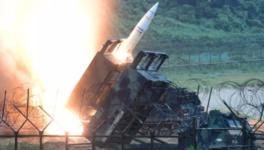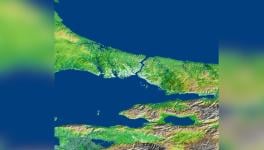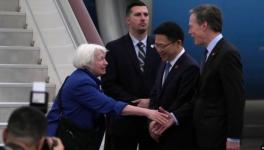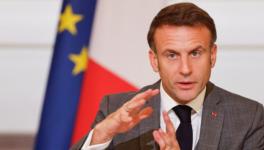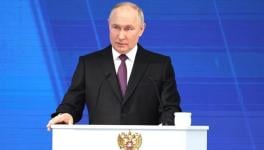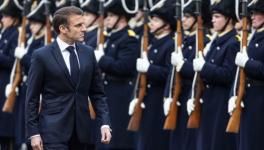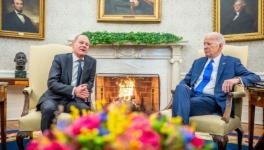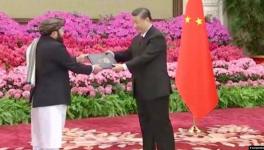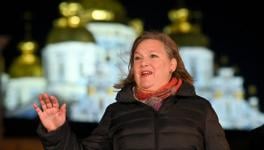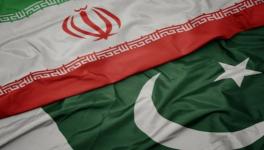Russia’s Victory in Ukraine Resonates in Central Asia
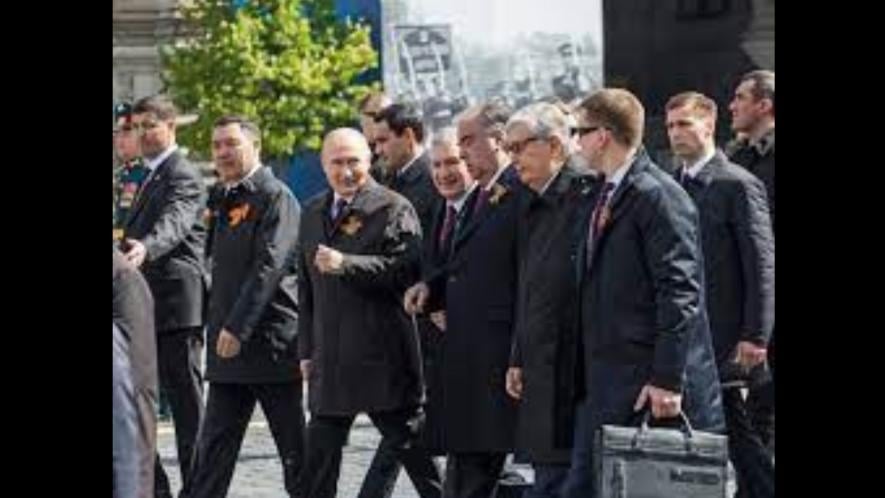
Courtesy: Indian Punchline
Russia’s stunning victory in the battle of Avdeevka and the rout of the Ukrainian military, boosts the credibility of Russia as provider of security for the Central Asian region. The point is not lost on the erudite Central Asian mind that Russia has single-handedly put the NATO (North Atlantic Treaty Organisation) on the back foot.
This becomes a defining moment, as it complements the comfort level stemming out of the new normalcy in Afghanistan, thanks to Russia’s effective diplomatic engagement with the Taliban.
Yet another vicious cycle of Western propaganda is petering out — predicated on the false assumptions that Russia’s influence in Central Asia is in “decline” (Wilson Centre); that the Central Asian states are “are emerging from Russia’s shadow and asserting their independence in ways not seen since the collapse of communism in 1991” (Financial Times); that in the wake of the war in Ukraine, Central Asian leaders “might well be now considering how long Putin will be able to remain in power in Russia” (Radio Free Europe / Radio Liberty).
In reality, the economic performance of the region in 2023 registered an impressive GDP (gross domestic product) growth of 4.8%. And Russia contributed to this success story. The Ukraine war led to the vacation of Western firms from the Russian market, which created new opportunities for regional states. At the same time, the conditions under sanctions prompted Russian firms and capital and Russian citizens to relocate their businesses to the Central Asian region.
Central Asian entrepreneurs haven’t missed the lucrative opportunities to source Western goods and technology for the Russian market — walking a very tight rope by ensuring compliance with Western sanctions, while also nurturing their interdependence and integration with Russian markets. The recovery of the Russian economy and its 3.6% growth last year created business opportunities for Central Asian countries.
Moscow’s policies aim at a ‘Renaissance’ in the region’s relations with Russia. The new thinking in Moscow meant that Putin took a hands-on role to maintain a high momentum of contacts with the Central Asian leaderships at a personal level, making use of all available formats of interaction bilateral as well as regional. The Russian approach allowed space for the regional states to adopt a ‘neutral’ stance on the war.
A comprehension problem for outsiders is very often that the Central Asian attitudes are seldom in overt mode, and under specific circumstances (such as Ukraine war), they need to be discerned in terms of preferences. Thus, the political message out of the May 9 parade in Moscow last year when all the Central Asian presidents joined Putin at the ceremonies on the Red Square was a massive gesture of support for Russia — and for Putin personally.
Throughout 2023, the Central Asian states found themselves targeted in an unprecedented diplomatic effort by the West to uphold the sanctions against Russia. The US Secretary of State Antony Blinken and French President Emmanuel Macron visited the region. Two historic summits in the ‘C5+1’ format were hosted by President Joe Biden and German Chancellor Olaf Scholz, respectively, in Washington and Berlin.
But the Western interlocutors refused to see the writing on the wall. Blinken’s Kazakh counterpart told him that Astana ‘does not feel any threats or risks from the Russian Federation.’ The joint statements issued after the two ‘C5+1’ summits did not even mention Ukraine!
Putin’s new thinking puts the great game on the back burner and instead prioritises the accretion of content in Russia’s relations with the Central Asian states, especially in economic and humanitarian spheres. This approach has palpably dissipated the ‘Big Brother’ syndrome. Putin’s meetings with his counterparts from Tajikistan, Uzbekistan and Kazakhstan in Kazan on Wednesday took place in a palpably relaxed atmosphere. (here, here and here)
Interestingly, Emomali Rahmon, Tajik president, wished not only Putin’s success “in everything you do” but his “nerves of steel” as well. Kassym-Jomart Tokayev, Kazakh president underscored meaningfully that “under your (Putin’s) distinguished leadership, Russia has achieved notable, impressive successes. In fact, your statements and actions are shaping the global agenda.” Tokayev’s remark is particularly noteworthy, as western analysts had spotted him as a potential mutineer against Putin in the steppes!
However, in the final analysis, if Russia’s security relationship with the Central Asian region has transformed during the past couple of years, it is because Moscow’s coordinated efforts to forge ties with the Taliban has gained traction lately. They helped diminish the threat perceptions regarding Afghanistan in the Central Asian region.
If the traditional pattern of addressing the threat perceptions was to resort to military means and by sequestering the region from Afghanistan, Russian diplomacy switched to a radically different approach by constructively engaging with the Taliban (although Taliban continues to be a proscribed organisation under Russian law) and strove to make the latter a stakeholder in building cooperative ties within a matrix of mutual interests. It paid off.
Moscow estimated that Taliban rule has stabilised the Afghan situation significantly and it is in Russian interests to help the Kabul administration to effectively counter the extremist elements in the country (especially the Islamic State, which is known to be a legacy of the US occupation of Afghanistan.) Russia leveraged its influence with the Central Asian states to ensure that western-backed anti-Taliban ‘resistance’ forces did not get sanctuaries.
Of course, the strategic objective is that the western intelligence will not be able to manipulate free-wheeling Afghan elements to destabilise the Central Asian region or the Caucasus all over again.
Taliban has been most receptive to the Russian overtures aimed at strengthening the Afghan statehood. Recently, Taliban went to the extent of boycotting a UN-sponsored conference on Afghanistan on February 18-19 in Qatar, which was, in reality, an invidious attempt by the US to re-engage the Taliban on the pretext of promoting “intra-Afghan dialogue” (which essentially meant the return of the West’s Afghan proxies living in exile in Europe and America.)
To be sure, the Taliban saw through the Western game plan to rebuild their intelligence network in Afghanistan and countered it by setting conditions for its participation in the Doha conference, including that it be the sole representative of Afghanistan at the meeting. The Taliban also opposed the appointment of a UN special envoy to Afghanistan, whose main task would be to promote “intra-Afghan dialogue”.
The Taliban’s Foreign Ministry, in a statement ahead of the Doha meeting, accused the international community of “unilateral impositions, accusations, and pressurisation.” The most interesting part of the pantomime playing out in Doha was that at the Taliban’s request, the Russian delegation that participated in the Doha meeting refused to meet the so-called ‘civil society representatives’ from Afghanistan. It signalled that Russia has begun working with the Taliban as the de facto rulers of Afghanistan.
Indeed, the Central Asian states heartily welcome this brilliant diplomatic initiative by Russia to strengthen regional security and stability. The region’s confidence level vis-a-vis the Taliban rulers has already reached a point that at the meeting with Putin in Kazan on Wednesday, Uzbek president Mirziyoyev raised the “important question” of Uzbekistan and Russia moving ahead with the construction of a new railway via Afghanistan connecting Central Asia with the adjacent regions and the world market.
MK Bhadrakumar is a former diplomat. He was India’s Ambassador to Uzbekistan and Turkey. The views are personal
Get the latest reports & analysis with people's perspective on Protests, movements & deep analytical videos, discussions of the current affairs in your Telegram app. Subscribe to NewsClick's Telegram channel & get Real-Time updates on stories, as they get published on our website.









